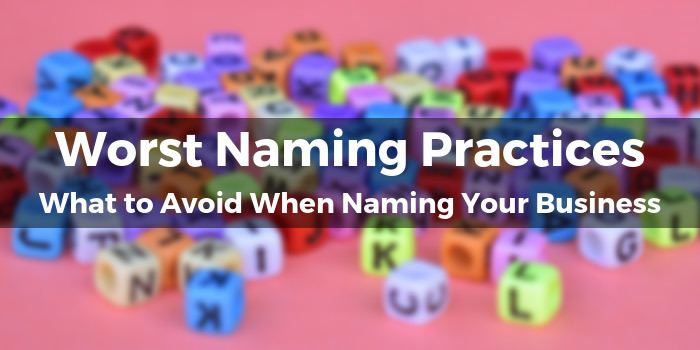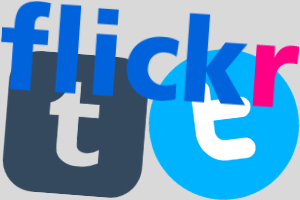Your business name establishes the tone for the future of your brand. A name affects everything from your future marketing, brands and the tone of your overall business. A solid startup name should make a point of connection between your business and your target demographic. Additionally, it needs to describe who you are and what beliefs and values you represent.

Just as a strong name can benefit your brand, a poor name can cause disaster for a startup. There are so many naming faux-pas out there that entrepreneurs should avoid because they can slow your business growth. Find out more about what these naming mistakes are and why you should avoid them as you start on the process of naming your business.
Difficult Names
You don't want your business name to be a tongue twister or a puzzle. If people can't say it, spell it, or remember it, you've already lost a portion of your potential market. So, steer clear from names with too many syllables, complicated spellings, or words that people need a dictionary to understand. I'm a fan of simplicity; it's often the most effective way to connect with people.
If you need help with your name try applying the “crowded bar theory” to your startup name. If you were telling a friend at a crowded bar all about your new business, would they understand the name of your brand easily?
A great example of this would be a restaurant named Sam and Ella’s. In a crowded bar this name may accidentally sound like the word salmonella, which is equal parts undesirable and unappealing. A naming mistake like this could ruin your brand.
What's the Crowded Bar Theory?
The gist of this concept is actually pretty straightforward: if you want to be heard and remembered, you should aim to have a name, message, or brand that stands out even in a noisy, crowded bar. You know how some songs just cut through the chatter and make everyone want to dance? That's the energy your business should have. Intriguing, right?
Volume Isn't Enough
Look, shouting louder than everyone else might get you some momentary attention, but it's not a long-term strategy. People will remember you, but probably not in the way you want. I've found that what really sticks is a combination of uniqueness, clarity, and relevance.
You want a name or message that not only catches attention but also leaves an impression. It's about making people turn their heads for the right reasons, you know?
Real-World Application
Let's say you're launching a new craft beer. Naming it something like "Hoppy McHopface" might catch people's attention for a minute because it's quirky. But does it have the kind of longevity and brand appeal you're going for? Probably not.
Now, what if you name it something that tells people what makes it unique? Like "Vanilla Sky IPA" for a beer that has vanilla undertones. Now that's a name that makes people curious and tells them a bit about what they're getting into.
It's Not Just About the Name
The Crowded Bar Theory doesn't just apply to naming your business or product. It's about your entire brand message, from your logo to your tagline to the way you engage with customers. Maybe it's the vibe you set in your physical or online store, or perhaps it's a killer marketing campaign that resonates with people. The point is to be the tune that everyone wants to dance to, even in a crowded space full of distractions.
Risks to Consider
Of course, there's always a risk of going too far in trying to be memorable. Shock value can backfire, and you don't want to be the name people remember for the wrong reasons. We've all seen those companies try too hard and end up as a cautionary tale, haven't we?
So, the Crowded Bar Theory is basically your roadmap to standing out in a busy, noisy world. Go for something that's loud enough to be heard but has enough substance to be remembered fondly. It's a bit of an art and a science, but when you get it right, you're the song everyone wants to hear again and again.
Boring Names
While it is always smart to select a name that is informative and tells the audience about what your business offers, overly-descriptive names tend to be boring.
An effective name needs to hold a small amount of suspense without being too vague or mysterious. Get creative when coming up with potential brand names.
Trendy Names

Looking at startup names from the past few decades reveals certain naming trends. An example is that during the mid 2000s many startup names lacked vowels like Tumblr, Twttr and Flickr. In the last ten years, names with –ify suffixes like Spotify, Gamify, and Coworkify became an extremely popular naming fad for new businesses.
Although it can occasionally be a smart idea to take advantage of new name trends to get your creative juices flowing, you should remember that there are consequences for choosing a fad name. Trendy names can feel dated and like a product of their time. If you use a naming trend too late, your startup could possibly fall a few steps behind the competition in the fast-paced world of businesses and startups. Try brainstorming business names using this list to give yourself a better idea of how you can use some different types and trends for your startup name in a helpful and thoughtful way.
Long Names
The longer your brand name is, the more confusing and forgettable it will be for your target demographic. Try to cut down your ideas by taking out any unnecessary descriptors, articles, and suffixes of your name to make it shorter. If you still have not discovered a business name that has an available URL, try checking the internet for domains for sale--you might discover that the perfect name does, in fact, come with a perfect URL.
Names That Limit Future Growth
We all hope our businesses will grow and evolve, right? Well, imagine your business is initially about selling funky sunglasses, and you name it "Pop Specs Manics." What happens when you decide to expand your product line to include other types of accessories? Your name now puts you in a box, and it's tough to climb out. Keep the future in mind when you pick a name.
Don't Go Overboard on Personal Branding
I mean, let's be real, you might be awesome, but your business should have an identity that goes beyond just you. If you're the entire show, what happens if you want to step back or even sell the business one day? Who is "John Smith Solutions" without John Smith? Plus, your employees might feel a bit like they're just extras in "The [Your Name Here] Show," and that's not great for team morale, is it?
The Customer Connection
Another angle to consider is customer relatability. If your brand is all about you, people who don't relate to you personally may not give your business a chance, even if your products or services are top-notch. You want to cast a wide net, right? A strong brand should make room for different kinds of customer relationships, not just fanboy or fangirl vibes for the founder.
Balance is the Sweet Spot
I think the trick here is finding a balance between a strong personal brand and a strong business brand. You can be the face of your business without being the entire identity. Use your personal brand to connect with customers, to share your story, and to add authenticity to your business. But also build up other aspects of your business's brand: its mission, its unique selling points, its community involvement, and so on.
Offensive or Insensitive Names
Last but not least, you don't want to offend anyone with your business name. Names that are insensitive to race, gender, culture, or religion can not only alienate potential customers but also attract negative publicity. Trust me, this is a battle you don't want to fight.
Conclusion
Although naming your business can be a challenge, the effort that you dedicate to the naming process will result in an effective, captivating name that attracts your target audience. Following some of the basic guidelines outlined above that describe what to avoid instead of only what to do can help you open up your creative flow and find the perfect name very quickly.

Grant Polachek is the Director of Marketing at Inc 500 company Squadhelp.com, the worlds #1 naming platform, with nearly 20,000 customers from the smallest startups across the globe to the largest corporations including Nestle, Philips, Hilton, Pepsi, and AutoNation. Get inspired by exploring these winning ideas for business names.
Author // Grant Polachek

